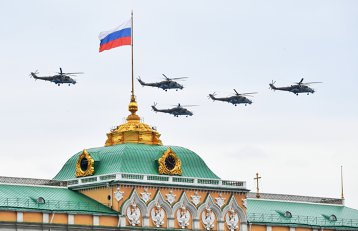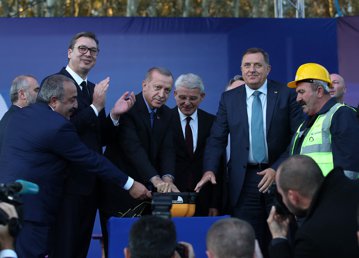
A Chinese concept for the 21st century: Three wars, no fight
In order to get its global power status, China modernizes its defence and security system, after a great economic increase and the improvement of technological capacities. Beijing’s most important objectives are the regional importance and international influence increase, and for that its needs economic growth, diplomacy and military power. The Chinese strategic documents see the existence of an army able to start wars and fight, to deter possible enemies and protect China’s interests as the main requirement for such a development. Also, China deploys influence missions against cultural institutions, media organizations, businesses environment and the academic one, US political communities, as well as in other countries, against international institutions, in order to get results that could support its strategic and military objectives.

China’s ambition to become a global power, through US’s eyes
A few months after the Defense Intelligence Agency / DIA published the China Military Power report (January 2019), the Defense Department set up (in May) the report whereby it annually informs the US Congress on China's military and security concerns.
Both documents have, in over 100 pages each, elements that support the basic idea: China is constantly pursuing military modernization, concurrently with the economic growth and improved technological capabilities to get the global power status.
Both documents provide an insight into Beijing's policy and strategic intentions, military objectives, and data on capabilities’ organization and structure involved in reaching these goals.
Still, if Agency's report refers to People's Liberation Army - Chinese armed forces - including nuclear, biological and chemical forces, the Defense Department report considers the whole security system.
In China, intelligence activities are mainly developed under State Security Ministry’s aegis, a civil service whose tasks include national security’s protection, domestic political and economic stability, State secrets’ protection, counter-intelligence operations, Chinese people and organization, who develop or support harmful actions for state’s security. Information/counter information activities are also being developed inside Public Security’s Ministry, Police’s Armed Forces (China’s armed forces paramilitary component) or People's Liberation Army.
The regional importance and increased international influence are objectives followed and gradually achieved through economic growth, diplomacy, military influence. How does China act in order to ensure its internal development, regional prominence, and global power expansion? Briefly, according to this year’s Pentagon Congress’s report, Beijing is acting as follows:
- Continues the implementation of long-term economic plans, such as Made in China 2025 and One Belt, One Road, which provides direct economic support for military modernization objectives. Advancing into economic projects can lead to foreign expansion and deployment of military bases reasoning these investments’ protection. Also, Chinese leaders are trying to align military technology’s development with civilian technology, to increase efficiency and innovation, an initiative known as Civilian-Military Integration, a national strategy to stimulate the civil sector enter the national defense market.
Announced since May 2015, the Made in China 2025 program wants to favor indigenous enterprises to the detriment of foreign participants within the Chinese markets, by providing subsidies and strengthening measures to protect national industry, while pressuring on foreign firms planning to do business in China.
The One Belt One Road Initiative seeks to strengthen economic ties with project and signatory countries, and influence them to align with China's vision in developing Euro-Asian transport infrastructure. This is a direct confrontations deterrence measure and one to avoid criticism against in approaching the main issues, as some participating countries could think they will be dependent on the Chinese capital, and that some investments in the program could create potential military benefits for China;
- They are making great efforts to establish an increasingly capable People's Liberation Army. Strategic documents are underscoring the need for an army able to start wars and fight, discourage potential adversaries, and protect China's international interests. Military modernization seeks to increase capabilities in maritime transport, offshore operations, remote operations, space, information and cyber fields. Also, the military modernization aims to reduce US’s technological and operational advantages;
- Hence, disputes are managed so that not to jeopardize regional security, which remains essential for the economic development. China is willing to take coercive measures - both military and non-military - to promote its interests and diminish other states’ opposition, but tactics used in the area are chosen so as to not start an armed conflict with US, allies and their East and South Asians partners.
- But China does not only develop economic growth programs and military modernization programs. There is also something that Pentagon's report defines as special theme in the section dedicated to addressing major developments that have military and security consequences for the United States: influence operations.
These are, according to RAND Corporation’s definition, operations related to information collection about an opponent, as well as the use of propaganda and its products dissemination in order to keep ahead of it.
The three wars strategy and online influence
According to Defense Department's report, China is developing operations against cultural institutions, media organizations, business and academic environments, US’s political communities and in other countries as well, against international institutions, in order to get favorable outcomes to support its strategic and military goals. It’s all in line with the Three Wars Strategy, a concept used by People's Liberation Army, after being approved, in 2003, by the Chinese Communist Party and the Central Military Commission. It was, later, developed as the Military Strategy Science (from 2013 and 2015), Chinese Army’s doctrine, as a force multiplier in military operations and political and diplomatic scenarios.
The concept was revealed for the public in US’s 2012 Defense Department report on China.
A year later, however, following the South China Sea incident (USS Cowpens, a missile launcher cruiser, had to avoid a collision with a Chinese navy ship), the Three Wars became the topic for a ... net estimation.
Office of Net Assessment - a Pentagon independent think tank created back in 1973 to identify possible and future threats and US opportunities, has elaborated a 566-pages unclassified study, describing the asymmetric technology –three wars- which replaces a conventional or nuclear conflict. Publishing the study was perceived unusual at that time, since Office of Net Assessment materials were not usually revealed for the public.
Considered a non-military method to reach military objectives, used to undermine enemy’s spirit and ideology, the concept of Three Wars refers to psychological operations, media operations and legality operations.
Briefly, it is all about influencing the public opinion, internally as well as internationally, influencing foreign decision-makers when approaching China's policy in influencing the legal context, including when identifying China's legal actions’ justification. It is about getting political power, shaping the environment the army could operate in, through a tridimensional fight, a war following other rules.
Defense Department’s May report, "China’s 2019 Security and Defense Evolution", claims that Liberation People's Army focuses on the Three Wars strategy in operational planning. Concretely, it uses propaganda, deception, threats and coercion to influence opponent's decision-making capacity (the psychological dimension), disseminates information to influence public opinion and get media support (media dimension), uses domestic and international laws to get world’s support (Three Wars’ legal dimension). According to that strategy, China considers that the cyber space offers influence operations opportunities, and People's Liberation Army is likely to use online influence actions to support the Three Wars strategy and undermine opponent's decision in case of an event or conflict.
By implementing the strategy they are trying to impose the Chinese version in foreign policy, the influence operations being coordinated at a high level and executed by actors such as the United Front Work Department (Communist Party Agency that manages relations with individuals and organizations inside and outside China), the Propaganda Ministry, State Security Ministry.
Intelligence services and taking the enemy down without a fight
One of strategy’s important elements is getting Chinese people from abroad, ethnic Chinese people from other countries, sometimes using coercive measures, including blackmailing them to be engaged in influence operations on Chinas’ behalf. The Thousands of Talents program prioritizes Chinese people’s recruitment, immigrants enrolled in educational and scientific fields, who are essential for the Chinese government in developing science and technology, especially defence.
The academic environment, education institutions, think tank and state-run media are being used in the soft power campaign to support the Chinese security interests, Chinese leaders probably thinking that open democracies, including the United States, are prone to influence operations.
Such operations are focusing on identifying and recruiting power brokers within a foreign government, to promote those policies that are favoring China's growth, despite Chinese state’s declarative status as non-interfering in other state domestic affairs. The Chinese diplomacy emphasizes building personal relationships with influence people, assisting and insisting on win-win cooperation. This approach allows China to provide quick achievements for foreign partners, often in exchange for gestures that seem symbolic, but which support the Chinese long-term interests.
Information services are easing these operations. They are taking advantage on the national intelligence law, published in 2017, the first such normative act that addresses both the National Security Ministry and the Public Security Ministry. The law requires Chinese companies and Chinese citizens to provide the necessary support, assistance and co-operation at intelligence structures’ request, considering that preemptive spying is not allowed, with national information being defensive in nature.
The law is controversial and susceptible to foster coercive action, given that is does not define intelligence and intelligence activity concepts, hence does not clarify the limitations imposed on individuals and organizations. It has also generated concern for foreign companies operating in China on its application’s consequences, especially if it is corroborated with another law, the IT security law (2016), which requires network operators to work with officials in security field.
Two articles are discussed in particular, foreseeing the following:
- all organizations and citizens are forced to provide support and assistance and cooperate with the state information service;
- Chinese intelligence agencies can collect and process information about any entity or natural person from abroad that jeopardizes China's security and national interests.
Information services are forced to operate both inside and outside China, and foreign groups and natural persons that are harming the national security must be investigated, under the so-called dream of national rejuvenation’ process (President Xi Jinping).
Chinese officials think that China's growth will be beneficial and constructive for the global community, which requires a global message and coordinated technique for presenting a strong, secure and optimistic China. And US must ... stop always using national security as a pretext and end Chinese enterprises’ unreasonable suppression (Geng Shuang, Chinese Foreign Affairs Ministry spokesman).
China's strategy and operation methods does not seem to differ from other states methods. Securing interests and preventing destructive conventional conflicts are not just China’s targets.
What else is, for example, in US, a net assessment? The Cold War Pentagon concept, created jointly with Andrew Marshall, the Office of Net Assessment founding director, refers to the global strategic power balance analysis. Estimating opponent's military capabilities, taking into account doctrines, goals, security culture, net assessment provides an overview of long-term strategic trends and opponent profound understanding.
In such an international environment, defined by competition rather than cooperation, net assessment reveals key decision makers’ opportunities when information made nuclear weapons useless, and the conventional conflict became too problematic to achieve political goals.
Chinese intelligence services are, basically, acting like all other states’ structures, regardless of strategic concepts names and strategies they follow. Whether it is about using human relations as a bridge over cultural and linguistic barriers in the most challenging environments, or supporting cultural skills or transcultural competencies’ development, security culture’s growth, or opponent’s net valuation, the conclusion is the one supported, centuries ago, by Sun Tzu: “Ultimate excellence lies not in winning every battle, but in defeating the enemy without ever fighting.”
Translated by Andreea Soare


